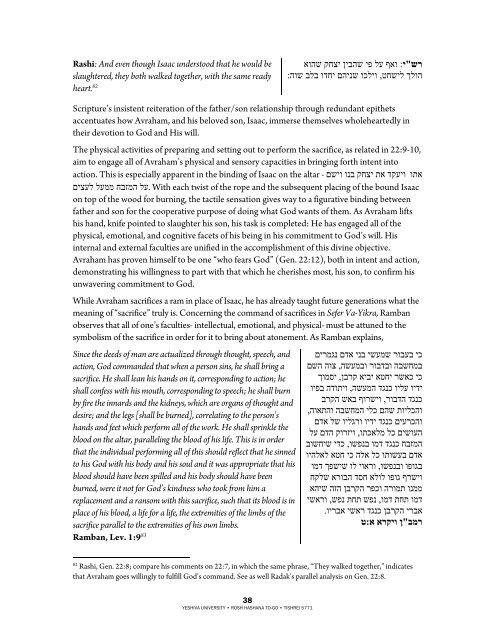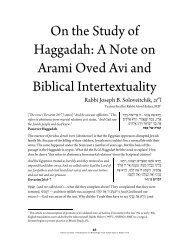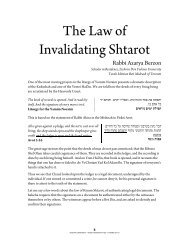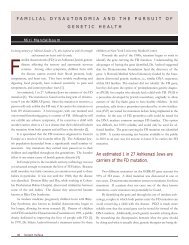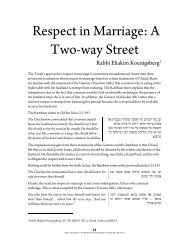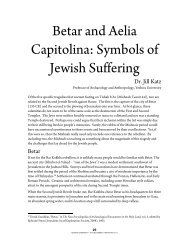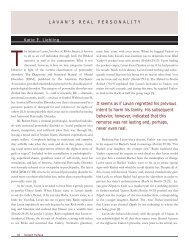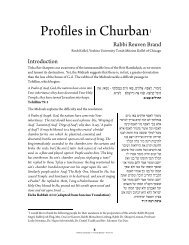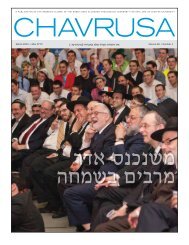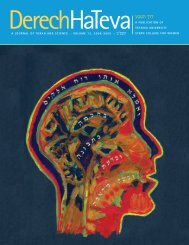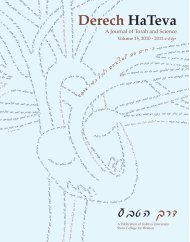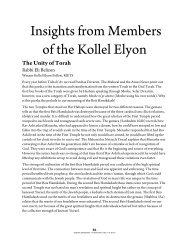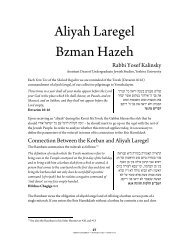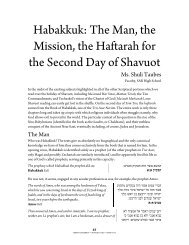YESHIVA UNIVERSITY • ROSH HASHANA TO-GO ... - YUTorah.org
YESHIVA UNIVERSITY • ROSH HASHANA TO-GO ... - YUTorah.org
YESHIVA UNIVERSITY • ROSH HASHANA TO-GO ... - YUTorah.org
You also want an ePaper? Increase the reach of your titles
YUMPU automatically turns print PDFs into web optimized ePapers that Google loves.
Rashi: And even though Isaac understood that he would be<br />
slaughtered, they both walked together, with the same ready<br />
heart. 82<br />
38<br />
<strong>YESHIVA</strong> <strong>UNIVERSITY</strong> <strong>•</strong> <strong>ROSH</strong> <strong>HASHANA</strong> <strong>TO</strong>-<strong>GO</strong> <strong>•</strong> TISHREI 5771<br />
אוהש קחצי ןיבהש יפ לע ףאו : י"<br />
שר<br />
: הוש בלב ודחי םהינש וכליו , טחשיל ךלוה<br />
Scripture’s insistent reiteration of the father/son relationship through redundant epithets<br />
accentuates how Avraham, and his beloved son, Isaac, immerse themselves wholeheartedly in<br />
their devotion to God and His will.<br />
The physical activities of preparing and setting out to perform the sacrifice, as related in 22:9-10,<br />
aim to engage all of Avraham’s physical and sensory capacities in bringing forth intent into<br />
action. This is especially apparent in the binding of Isaac on the altar - םשיו ונב קחצי תא דקעיו ותא<br />
םיצעל לעממ חבזמה לע. With each twist of the rope and the subsequent placing of the bound Isaac<br />
on top of the wood for burning, the tactile sensation gives way to a figurative binding between<br />
father and son for the cooperative purpose of doing what God wants of them. As Avraham lifts<br />
his hand, knife pointed to slaughter his son, his task is completed: He has engaged all of the<br />
physical, emotional, and cognitive facets of his being in his commitment to God’s will. His<br />
internal and external faculties are unified in the accomplishment of this divine objective.<br />
Avraham has proven himself to be one “who fears God” (Gen. 22:12), both in intent and action,<br />
demonstrating his willingness to part with that which he cherishes most, his son, to confirm his<br />
unwavering commitment to God.<br />
While Avraham sacrifices a ram in place of Isaac, he has already taught future generations what the<br />
meaning of “sacrifice” truly is. Concerning the command of sacrifices in Sefer Va-Yikra, Ramban<br />
observes that all of one’s faculties- intellectual, emotional, and physical- must be attuned to the<br />
symbolism of the sacrifice in order for it to bring about atonement. As Ramban explains,<br />
Since the deeds of man are actualized through thought, speech, and<br />
action, God commanded that when a person sins, he shall bring a<br />
sacrifice. He shall lean his hands on it, corresponding to action; he<br />
shall confess with his mouth, corresponding to speech; he shall burn<br />
by fire the innards and the kidneys, which are <strong>org</strong>ans of thought and<br />
desire; and the legs [shall be burned], correlating to the person’s<br />
hands and feet which perform all of the work. He shall sprinkle the<br />
blood on the altar, paralleling the blood of his life. This is in order<br />
that the individual performing all of this should reflect that he sinned<br />
to his God with his body and his soul and it was appropriate that his<br />
blood should have been spilled and his body should have been<br />
burned, were it not for God’s kindness who took from him a<br />
replacement and a ransom with this sacrifice, such that its blood is in<br />
place of his blood, a life for a life, the extremities of the limbs of the<br />
sacrifice parallel to the extremities of his own limbs.<br />
Ramban, Lev. 1:9 83<br />
םירמגנ םדא ינב ישעמש רובעב יכ<br />
םשה הוצ , השעמבו רובדבו הבשחמב<br />
ךומסי , ןברק איבי אטחי רשאכ יכ<br />
ויפב הדותיו , השעמה דגנכ וילע וידי<br />
ברקה שאב ףורשיו , רובדה דגנכ<br />
, הואתהו הבשחמה ילכ םהש תוילכהו<br />
םדא לש וילגרו וידי דגנכ םיערכהו<br />
לע םדה קורזיו , ותכאלמ לכ םישועה<br />
בושחיש ידכ , ושפנב ומד דגנכ<br />
חבזמה<br />
ויהלאל אטח יכ הלא לכ ותושעב םדא<br />
ומד ךפשיש ול יוארו , ושפנבו ופוגב<br />
חקלש ארובה דסח אלול ופוג ףרשיו<br />
אהיש הזה ןברקה רפכו הרומת ונממ<br />
ישארו , שפנ תחת שפנ , ומד תחת ומד<br />
. וירבא ישאר דגנכ ןברקה ירבא<br />
ט:<br />
א ארקיו ן"<br />
במר<br />
82 Rashi, Gen. 22:8; compare his comments on 22:7, in which the same phrase, “They walked together,” indicates<br />
that Avraham goes willingly to fulfill God’s command. See as well Radak’s parallel analysis on Gen. 22:8.


